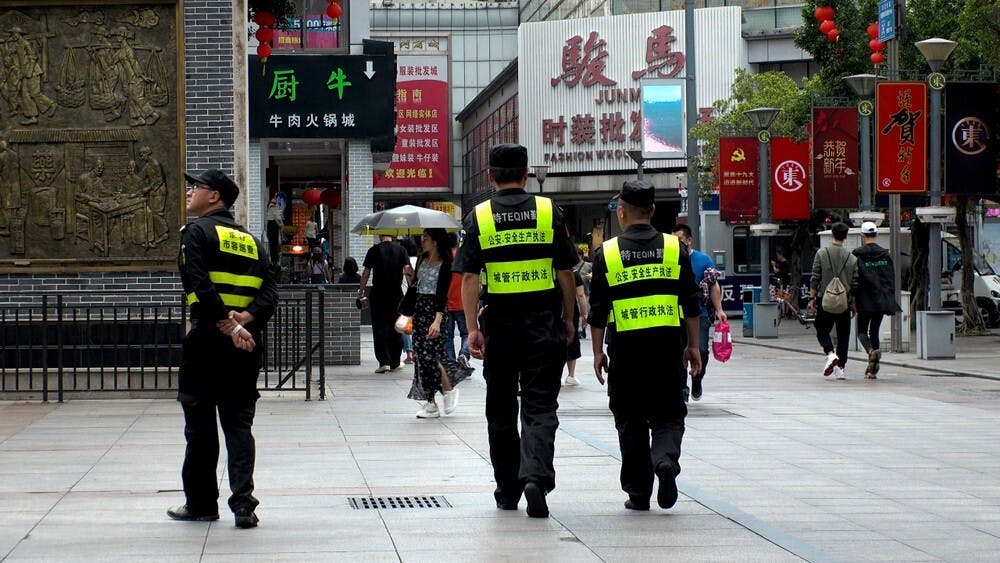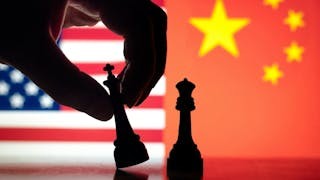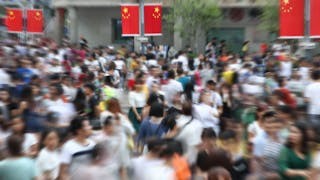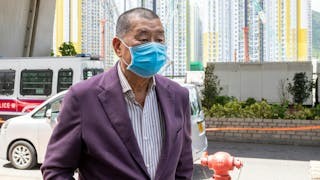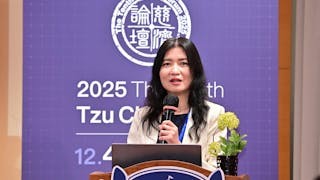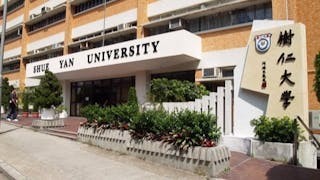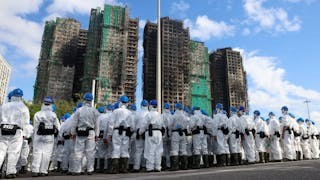今年是中國共產黨成立100周年,中共中央政法委秘書長陳一新1月10日在中央政法工作會議上的發言,顯示中國在國家安全方面考慮到更多的範圍。
中央政法工作會議1月9日至10日在北京舉行。陳一新指出,政法工作任務重、難度大、要求高,特別是要抓好「十件要事」,推動政法工作高質量發展。
不僅是保安維穩護主權
「十件要事」開宗明義,首先要求「掀起學習宣傳貫徹習近平法治思想熱潮。引導政法幹警做習近平法治思想的堅定信仰者、積極傳播者、模範實踐者」。
其次,陳一新要求「全力做好建黨100周年安保工作。嚴密落實保安和維穩措施,以全國社會大局穩定」迎接中共建黨黨百年。很明顯,不僅會收緊內地的國安措施,也會在港澳兩個特區加強維穩。
第三,陳一新表示,中國要「謀劃推動中美關係健康穩定發展的相關舉措,加強對外執法安全合作,健全一帶一路服務保障機制,維護國家主權、安全和發展利益」。
第四,根據陳一新的說法,要「嚴密防範打擊敵對勢力滲透顛覆破壞活動,推進香港《國安法》實施,鞏固反恐怖反分裂鬥爭成果,系統防控網絡安全風險,築起維護國家政治安全的銅牆鐵壁。推進掃黑除惡常態化機制化」。
陳一新所說的以上幾點,無論對內地、香港和澳門都很重要,尤其是《港區國安法》的實施,導致一些涉嫌違反該法的人,相繼被捕和被起訴,而我們在香港目睹了事態的發展。任何被視為危害國家安全的網站都很容易被管控。舉例說,在香港,一個涉嫌洩露一些執法部門和親政府精英身份資料的網站,由於當局要「調查」,便被關閉了幾個小時。
穩就業保民生亦要考慮
陳一新又提及,要強化法治服務保障;研究提出更多服務「六穩」(穩就業、穩金融、穩外貿、穩外資、穩投資、穩預期)、「六保」(保居民就業、保基本民生、保市場主體、保糧食能源安全、保產業鏈供應鏈穩定、保基層運轉)的法治保障措施,着力營造公平公正的法治化營商環境,為構建新發展格局增添法治底色。
他提出的另一些「要事」,還包括「針對超大城市、特大城市、大城市、中小城市的特點,實行分類指導推進,不斷提高治理水平,努力把重大矛盾風險化解在市域,確保不外溢不擴散」;「推進掃黑除惡常態化機制化,建立健全的常態化機制,做到打早打小、露頭就打,不斷增強民眾安全感」;「推進政法領域全面深化改革。着力推動執法司法制約監督體系改革和建設,提高執法司法公信力」;「全面開展政法隊伍教育整頓。突出政治忠誠、清除害群之馬、整治頑瘴痼疾、弘揚英模精神,全面推進從嚴管黨治警」,以及「做好疫情防控工作。大力推進依法防疫抗疫,嚴格落實口岸出入境管控措施,做好入境人員分流轉運工作,築牢國門安全防線」等要求。
陳一新在國家安全層面上的言論具有政治意義,他被視作中國政壇的「後起之秀」。他也是去年內地抗擊新冠病毒的主要領導之一,因此,他概括的「十件要事」,不僅在今年,而且在未來幾年都具體闡明了中國國家安全的範圍。
China’s National Security Concerns
The remarks made by Chen Yixin, the secretary-general of the Political and Legal Work Commission (PLWC) of the Communist Party of China (CPC) on January 10 showed that China has tremendous national security concerns at a time when the CPC is entering its 100thanniversary in 2021.
The PLWC conference was held in Beijing on January 9 and 10. Chen Yixin said that the political and legal work in China encountered tremendous responsibilities and duties, great expectations, and the need to promote high quality development in ten areas.
First and foremost, members of the mainland law-enforcement agencies should learn how to implement “Xi Jinping’s rule of law thought” and all the police dealing with political and legal work must be the “faithful believers,” “active preachers” and “model implementation agents.”
Chen’s remarks on January 10 here were not new. On December 30, 2020, he had written an article in the People’s Daily, emphasizing that “the Xi Jinping rule of law thought is the newest result of the Sinification of Marxism” in China. Chen stressed that Xi Jinping as the General Secretary of the Chinese Communist Party is a “political statesman, thinker and strategist” who has made tremendous contributions to Karl Marx’s rule of law thought. Specifically, President Xi has emphasized that the rule of law construction is made for the sake of the people’s interest, rights, welfare and expectations, and that the rule of law implementation can strengthen public satisfaction, well-being and safety.
Second, Chen added on January 10 that security work must be consolidated at a significant time when the Party is entering its 100thanniversary. Given the emphasis of high-level officials on the need to ensure national security in the PRC in 2021, it is natural to witness a tightening of national security not only in the mainland, but also in Hong Kong and Macau.
Third, Chen said that China seeks to promote “healthy and stable development in Sino-American relations” and to cooperate with law-enforcement agencies externally in the security aspect. The service and protection mechanism in the Belt and Road initiatives must be maintained so that China can protect its national sovereignty, security and development interest.
Fourth, according to Chen, it is necessary to “resolutely protect the nation’s political security” and to “prevent hostile elements from infiltration, subversion and damaging activities.” Moreover, the PRC must “promote the implementation of the Hong Kong national security law, to consolidate the struggle and fruits of success in anti-terrorism and anti-secession, to systematically control the security risks of the Internet, and to construct an iron and a steel wall that can protect the nation’s political security.”
The remarks made by Chen are important to the mainland, Hong Kong and Macau. While the implementation of the national security law has led to a series of arrests and prosecutions of some people who allegedly violated the law, as we can witness the developments of Hong Kong, any website regarded as endangering national security is vulnerable to being controlled. For example, in Hong Kong, a website that allegedly revealed the identities of some law-enforcement authorities and pro-government elites was recently stopped for some hours due to the need for “investigation.”
Fifth, Chen mentioned the need to consolidate the service protection of the rule of law. The catchword of “service protection” includes the need to stabilize six areas and to protect six other aspects. The six areas that need to be stabilized include “residents’ employment, their basic livelihood, the market entity, the safety of food and energy supplies, the stability in the protection of the supply chain and logistics, and the protection of basic-level fortune.” The six other aspects that need to be protected, according to a resolution at the Politburo meeting of the Chinese Communist Party on July 31, 2018, include employment, monetary and financial industry, foreign export, foreign investment, domestic investment, and the stability of economic predictions. What Chen mentioned on January 10 was to build up from the previous resolutions reached by the Party to ensure continuities and stability during the Party’s 100thanniversary.
Sixth, Chen emphasized the importance of promoting urban and social governance in the mainland. Mainland cities are divided into three types: large, medium and small ones each of which has its governing characteristics, and each necessitates the implementation of the rule of law and different levels of risks assessment. He added that contradictions and risks in a city will be confined and they will be allowed to spread out. By implication, any protest, unstable event, accident or public health crisis would be contained in the city concerned, just like any outbreak of Covid-19 in any mainland city which requires “wartime” mobilization and immediate containment of the infectious disease.
All residents in the city affected by Covid-19 must undergo not only health tests but also confinement so that the disease cannot easily spread to other places. For instance, Shijiazhuang city in Hebei province on January 13 reportedly had 398 locals infected with Covid-19. The city envisaged an immediate lockdown and the prompt evacuation of some 5,500 residents from three villages to quarantine facilities.
Seventh, the mechanism of fighting against crime and gangs is undergoing the process of normalization. On January 4, Chen had held the 12thannual conference of fighting against crime, emphasizing that the three-year fight-crime campaign from 2019 to 2021 was not only successful but also characterized by prompt action taken by the police to combat criminal elements.
Chen revealed that the central-level law-enforcement agencies play a leadership role in overseeing the anti-crime work at the local level. Most importantly, local-level law-enforcement authorities must fulfill their targets of crime control. The purpose of central-level leadership is clear; local-level “protective umbrella” involving corrupt officials and criminal elements must be smashed and intensive performance appraisals are conducted to ensure effective local-level implementation of crime control.
Eighth, Chen pointed to the need for continuous supervision of the judicial authorities and the necessity of judicial reforms so that the public feel confident of the judiciary. As early as February 2020, Chen Yixin espoused his theory of judicial reforms in a mainland magazine named Qiushi, pointing to the need for the party committee and the political and legal work committee to supervise the work of the judiciary. He also recognized the necessity of streamlining the litigation procedures, using the prosecution branch to scrutinize the judicial branch, and increasing the transparency and legitimacy of judicial operation through a rigorous process of anti-corruption and control over the utilization of hidden actions among corrupt actors. Clearly, Chen has identified the weaknesses of China’s judiciary and suggested concrete remedies to tackle judicial corruption, inefficiency and operations.
Ninth, Chen has elaborated on the need for the political and legal work team members to undergo education and reform. In the Qiushi article published in February 2020, Chen had emphasized the importance of requiring the leaders of political and legal work to obey the law, implement the law and undergo educational training to understand and publicize the law. Like many other Confucian officials in ancient dynasties, Chen stressed the importance of sticking to moral values on the part of political and legal officers, promoting the “Chinese spirit” and “Chinese rule.” On the other hand, Chen realizes the need for political and legal officers to treat socialism as the core value, apart from the need to attach importance to social morals, professional ethics, family virtues and individual good conduct.
If Marxists emphasize the importance of economic base over superstructure, Chinese Marxists like Chen have equally stressed the significance of superstructure, which embraces Chinese cultural values and the socialist ideology. Not surprisingly, Chen in his People’s Daily article in late December 2020 asserted that the Xi Jinping rule of law thought represents “the Sinification of Marxism.”
Tenth, Chen has emphasized the necessity of preventing and containing Covid-19 effectively and concretely. Given the outbreak of some Covid-19 cases in Hebei, Jilin, Beijing and Heilongjiang, where invisible cases have been found, the mainland police have been playing a critical role of conducting quarantine work, while customs authorities adopt strict measures to inspect the food products imported into China. All other prisons, detention centers, and drugs rehabilitation centers are also regarded as crucial areas that need stringent controls over the possibility of outbreak of Covid-19.
Finally, Chen Yixin has emphasized the importance of maintaining high alert over security issues from now to the Lunar Chinese New Year when citizens will have to enjoy their holidays happily and safely.
It must be noted that Chen’s detailed remarks on China’s national security were made amid the publication of “Rule of Law China’s Construction Plan, 2020-2025,” which has mentioned that it is necessary to “prevent and oppose foreign forces’ intervention in the matters of Hong Kong and Macau, and to maintain Hong Kong and Macau’s long-term prosperity and stability.”
One mainland commentator, Wang Jiang, has interpreted this statement in the plan as a sign that the Hong Kong Special Administrative Region (HKSAR) “cannot become a gap for the nation.” If so, the perception of the PRC authorities of the 2019 protests as a “color revolution” and of the HKSAR as a possible Trojan Horse for foreign states to “subvert” both Hong Kong and the mainland is a real one – a perception that guided the PRC to enact and implement the Hong Kong national security law.
The construction plan also highlights the need to “explore a Taiwan model of ‘one country, two systems’ to promote the nation’s peaceful reunification process.”
On January 16, Chen Yixin commented in the Central Party School’s graduation ceremony that mainland cadres must understand the trend of “Eastern rise and Western decline,” pointing to the decline of Western states like the US and the rise of China. This phenomenon, according to Chen, is favorable to the PRC and the rise of the Chinese nation. However, Chen alerted the graduates to the possibilities of any sudden economic crisis regionally and globally, and of any “infiltration, subversion and damage from foreign forces” into China. As such, it is necessary to “eliminate the soil that affects political security.”
In conclusion, Chen Yixin’s remarks on the multiple dimensions of national security in China are politically significant. Born in Zhejiang province and previously worked in Hubei and Wuhan as party secretaries, Chen has been regarded as a rising star with bright prospects in Chinese politics. In 2020, he was one of the key leaders dealing with the containment of Covid-19 in China. The ten areas of security concerns outlined by Chen on January 10 concretely spelt out the dimensions of national security in the PRC not only in 2021 but also in the coming years
原刊於澳門新聞通訊社(MNA)網站,本社獲作者授權轉載。



